Fleurs du Mal Magazine



Joseph von Eichendorff
(1788-1857)
Durch!
Ein Adler saß am Felsenbogen,
Den lockt’ der Sturm weit übers Meer,
Da hatt er droben sich verflogen,
Er fand sein Felsennest nicht mehr,
Tief unten sah er kaum noch liegen
Verdämmernd Wald und Land und Meer,
Mußt höher, immer höher fliegen,
Ob nicht der Himmel offen wär.
Joseph von Eichendorff poetry
fleursdumal.nl magazine
More in: Archive E-F, CLASSIC POETRY
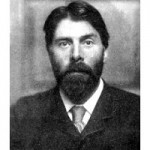
Robert Bridges
(1844 – 1930)
Sweet compassionate tears
Sweet compassionate tears
Have dimm’d my earthly sight,
Tears of love, the showers wherewith
The eternal morn is bright:
Dews of the heav’nly spheres.
With tears my eyes are wet,
Tears not of vain regret,
Tears of no lost delight,
Dews of the heav’nly spheres
Have dimm’d my earthly sight,
Sweet compassionate tears.
Robert Bridges poetry
fleursdumal.nl magazine
More in: Archive A-B, Bridges, Robert
Hendrik Marsman
(1899-1940)
De hand van de dichter
Glazen grijpen en legen;
veel jagen en reizen;
vrouwen omhelzen en strelen;
strijden op felle paarden
en blinkende wateren splijten;
spelen met licht en donker;
de dag en de nacht doorrijden
onder fluweel en schaduw en
flonkrende sterrenbeelden.
het staat niet in mijn hand gegrift;
en een hand is een leven, een lot;
ik lees slechts in fijn scherp schrift
– en dit geldt voor vroeger en later –
weinig liefde en wijn, veel water,
soms een racket, een zweep, maar
stellig nimmer een zwaard.
zo is mij enkel bewaard
langzaam maar vast te verwijven
in nijver monnikenwerk:
bidden en verzen schrijven
geel op geel perkament,
en mijn hand alleen te verstrengelen
met mijn eigen andere hand
en in een cel te versterven
oud op een houten bank.
Hendrik Marsman poetry
fleursdumal.nl magazine
More in: Archive M-N, Marsman, Hendrik
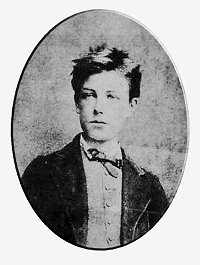
Arthur Rimbaud
(1854-1891)
Fêtes de la faim
Ma faim, Anne, Anne,
Fuis sur ton âne.
Si j’ai du goût, ce n’est guères
Que pour la terre et les pierres
Dinn ! dinn ! dinn ! dinn ! je pais l’air,
Le roc, les Terres, le fer.
Tournez, les faims ! paissez, faims,
Le pré des sons !
Puis l’humble et vibrant venin
Des liserons ;
Les cailloux qu’un pauvre brise,
Les vieilles pierres d’églises,
Les galets, fils des déluges,
Pains couchés aux vallées grises !
Mes faims, c’est les bouts d’air noir ;
L’azur sonneur ;
— C’est l’estomac qui me tire.
C’est le malheur.
Sur terre ont paru les feuilles :
Je vais aux chairs de fruit blettes.
Au sein du sillon, je cueille
La doucette et la violette.
Ma faim, Anne, Anne !
Fuis sur ton âne.
Arthur Rimbaud poetry
fleursdumal.nl magazine
More in: *Archive Les Poètes Maudits, Archive Q-R, Arthur Rimbaud, Rimbaud, Arthur, Rimbaud, Arthur
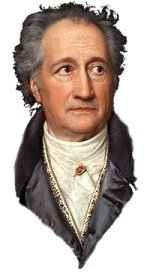
Johann Wolfgang von Goethe
(1749-1832)
Den Originalen
Ein Quidam sagt: »Ich bin von keiner Schule;
Kein Meister lebt, mit dem ich buhle;
Auch bin ich weit davon entfernt,
Daß ich von Toten was gelernt.«
Das heißt, wenn ich ihn recht verstand:
»Ich bin ein Narr auf eigne Hand.«
Johann Wolfgang von Goethe poetry
fleursdumal.nl magazine
More in: Archive G-H, Goethe, Johann Wolfgang von
 Meer dan er stiekem over denken, durfden ze echter niet. Kaffa wist dat hij het onderwerp van gesprek was. Hij kon zelfs af en toe zijn naam verstaan, hoewel hij niet veel opving van hetgeen ze over hem te vertellen hadden. Het deerde hem niet. Ze hadden het vaak over hem, daar was hij aan gewend. Aan hem maten de dorpelingen af hoe goed ze zelf wel waren. Hoe proper. Hoe rechtvaardig. Ze stalen niet, zoals Kaffa wel eens deed, omdat hij weinig verschil zag tussen mijn en dijn. Zij deden niet aan landloperij. En zij werkten.
Meer dan er stiekem over denken, durfden ze echter niet. Kaffa wist dat hij het onderwerp van gesprek was. Hij kon zelfs af en toe zijn naam verstaan, hoewel hij niet veel opving van hetgeen ze over hem te vertellen hadden. Het deerde hem niet. Ze hadden het vaak over hem, daar was hij aan gewend. Aan hem maten de dorpelingen af hoe goed ze zelf wel waren. Hoe proper. Hoe rechtvaardig. Ze stalen niet, zoals Kaffa wel eens deed, omdat hij weinig verschil zag tussen mijn en dijn. Zij deden niet aan landloperij. En zij werkten.
Nee, het volk van Solde maakte zich niet schuldig aan vergrijpen tegen Gods geboden. Ze leefden precies zoals de kerk het hun opdroeg. Hoe simpeler, hoe beter. Ze hielden hun donkerste gedachten voor zich. Slikten hun begeerten in, al zouden ze er af en toe maar al te graag aan toe willen geven. Als ze de kans maar kregen. Eigenlijk haatte Kaffa het hele dorp. Hij wist dat hij hier nooit als een volwaardig lid van de gemeenschap zou worden beschouwd. Tot het einde van zijn dagen zou hij de dorpsgek blijven. Voor niks deugend. Net als Jacob Ramesz, die ook tot niets anders in staat was dan het spel met de vlooien, waardoor hij zo arm en mager als een kerkrat was gebleven. Terwijl de timmerman de laatste spijker in de kist joeg, viel het hem op dat Kaffa problemen had. Hij zag het aan het gezicht van de zwerver, dat op onweer stond. Dat deed hem goed. Het gaf hem wat genoegdoening voor de vernedering die hij de afgelopen ochtend had opgelopen. Hij voelde hoe de slaap zijn lijf overmande. Hij gaf er onmiddellijk aan toe. Liet de hamer uit de handen vallen, sleepte de kist in de schaduw van de meidoorn en ging erin liggen. In de naar vers hout geurende kist viel hij direct in slaap. De knieën wat opgetrokken, omdat de koffer te kort voor hem was. Een lelijke dode timmerman in een mooie ruwe kist. Als hij werkelijk dood was, zouden ze hem bij de knieën moeten afbreken om hem passend te maken voor dit houten kostuum. De boskat leek in de gaten te hebben dat de timmerman sliep. Ze doolde rond in de werkplaats, schoot door het achterhuis en sprong achter het gereedschap op de werkbank.
Hoewel het gevaarlijk voor haar was, leek ze blij weer thuis te zijn. De rust had zijn intrede gedaan in het dorp. Van de zieke jongen, wiens vader daar zo schunnig in de kist lag, verwachtten de kraaien dat ook híj voor enkele uurtjes het sterven zou vergeten. Al was het alleen maar om hun een beetje slaap te gunnen, tot de zon over zijn hoogste stand heen zou zijn. De jongen was wakker en rustig. Hij lag met open ogen en veel helderder dan voorheen naar de buizerd te kijken, het dier dat hem vanaf zijn plaats in de meidoorn in de gaten hield. Op het moment wachtend dat de jongen zou opstaan. Om met hem naar het bos te gaan. Samen op muizen te loeren. Konijnen te vangen. En eekhoorns op te jagen, van boom tot boom, tot ze vermoeid uit de kruinen konden worden geschud zodat ze voor het grijpen waren. Zo’n vogel! Hoe zou hij kunnen weten dat de jongen geen kans meer kreeg om nog ooit naar het bos te gaan, ook al leek hij op dit moment redelijk bij kennis te zijn. Al was hij dan nog niet dood, de morgen zou hij niet meer halen. Volgens de kraaien tenminste. En die konden het weten. Die hadden al bij vele stervenden de wacht gehouden. Ze konden zo om en nabij wel zeggen hoeveel uurtjes dit kind nog voor zich had. De jongen leek in slaap te vallen. Ook de buizerd was moe. Alsof zijn gedrag al aan de mensen was aangepast, sloot hij de ogen en vertrok voor korte tijd naar zijn eigen roofvogelhemel. Zijn jachtveld, waar muizen, kippen en konijnen zo voor het grijpen liepen. De kraaien, suf als de anderen, waren stil. Ze zaten tegen de hoeken van het bed of lagen gewoon op hun rug in het gras. Wie niet beter wist, zou denken dat het grote kinderen waren die zich godsgruwelijk verveelden.
Ton van Reen: Landverbeuren (39)
wordt vervolgd
fleursdumal.nl magazine
More in: - Landverbeuren, Reen, Ton van
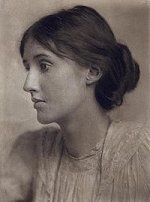 Virginia Woolf
Virginia Woolf
(1882-1941)
5. The String Quartet
(from: Monday or Tuesday)
Well, here we are, and if you cast your eye over the room you will see that Tubes and trams and omnibuses, private carriages not a few, even, I venture to believe, landaus with bays in them, have been busy at it, weaving threads from one end of London to the other. Yet I begin to have my doubts —
If indeed it’s true, as they’re saying, that Regent Street is up, and the Treaty signed, and the weather not cold for the time of year, and even at that rent not a flat to be had, and the worst of influenza its after effects; if I bethink me of having forgotten to write about the leak in the larder, and left my glove in the train; if the ties of blood require me, leaning forward, to accept cordially the hand which is perhaps offered hesitatingly —
“Seven years since we met!”
“The last time in Venice.”
“And where are you living now?”
“Well, the late afternoon suits me the best, though, if it weren’t asking too much —”
“But I knew you at once!”
“Still, the war made a break —”
If the mind’s shot through by such little arrows, and — for human society compels it — no sooner is one launched than another presses forward; if this engenders heat and in addition they’ve turned on the electric light; if saying one thing does, in so many cases, leave behind it a need to improve and revise, stirring besides regrets, pleasures, vanities, and desires — if it’s all the facts I mean, and the hats, the fur boas, the gentlemen’s swallow-tail coats, and pearl tie-pins that come to the surface — what chance is there?
Of what? It becomes every minute more difficult to say why, in spite of everything, I sit here believing I can’t now say what, or even remember the last time it happened.
“Did you see the procession?”
“The King looked cold.”
“No, no, no. But what was it?”
“She’s bought a house at Malmesbury.”
“How lucky to find one!”
On the contrary, it seems to me pretty sure that she, whoever she may be, is damned, since it’s all a matter of flats and hats and sea gulls, or so it seems to be for a hundred people sitting here well dressed, walled in, furred, replete. Not that I can boast, since I too sit passive on a gilt chair, only turning the earth above a buried memory, as we all do, for there are signs, if I’m not mistaken, that we’re all recalling something, furtively seeking something. Why fidget? Why so anxious about the sit of cloaks; and gloves — whether to button or unbutton? Then watch that elderly face against the dark canvas, a moment ago urbane and flushed; now taciturn and sad, as if in shadow. Was it the sound of the second violin tuning in the ante-room? Here they come; four black figures, carrying instruments, and seat themselves facing the white squares under the downpour of light; rest the tips of their bows on the music stand; with a simultaneous movement lift them; lightly poise them, and, looking across at the player opposite, the first violin counts one, two, three —
Flourish, spring, burgeon, burst! The pear tree on the top of the mountain. Fountains jet; drops descend. But the waters of the Rhone flow swift and deep, race under the arches, and sweep the trailing water leaves, washing shadows over the silver fish, the spotted fish rushed down by the swift waters, now swept into an eddy where — it’s difficult this — conglomeration of fish all in a pool; leaping, splashing, scraping sharp fins; and such a boil of current that the yellow pebbles are churned round and round, round and round — free now, rushing downwards, or even somehow ascending in exquisite spirals into the air; curled like thin shavings from under a plane; up and up . . . How lovely goodness is in those who, stepping lightly, go smiling through the world! Also in jolly old fishwives, squatted under arches, oh scene old women, how deeply they laugh and shake and rollick, when they walk, from side to side, hum, hah!
“That’s an early Mozart, of course —”
“But the tune, like all his tunes, makes one despair — I mean hope. What do I mean? That’s the worst of music! I want to dance, laugh, eat pink cakes, yellow cakes, drink thin, sharp wine. Or an indecent story, now — I could relish that. The older one grows the more one likes indecency. Hall, hah! I’m laughing. What at? You said nothing, nor did the old gentleman opposite . . . But suppose — suppose — Hush!”
The melancholy river bears us on. When the moon comes through the trailing willow boughs, I see your face, I hear your voice and the bird singing as we pass the osier bed. What are you whispering? Sorrow, sorrow. Joy, joy. Woven together, like reeds in moonlight. Woven together, inextricably commingled, bound in pain and strewn in sorrow — crash!
The boat sinks. Rising, the figures ascend, but now leaf thin, tapering to a dusky wraith, which, fiery tipped, draws its twofold passion from my heart. For me it sings, unseals my sorrow, thaws compassion, floods with love the sunless world, nor, ceasing, abates its tenderness but deftly, subtly, weaves in and out until in this pattern, this consummation, the cleft ones unify; soar, sob, sink to rest, sorrow and joy.
Why then grieve? Ask what? Remain unsatisfied? I say all’s been settled; yes; laid to rest under a coverlet of rose leaves, falling. Falling. Ah, but they cease. One rose leaf, falling from an enormous height, like a little parachute dropped from an invisible balloon, turns, flutters waveringly. It won’t reach us.
“No, no. I noticed nothing. That’s the worst of music — these silly dreams. The second violin was late, you say?”
“There’s old Mrs. Munro, feeling her way out — blinder each year, poor woman — on this slippery floor.”
Eyeless old age, grey-headed Sphinx . . . There she stands on the pavement, beckoning, so sternly, the red omnibus.
“How lovely! How well they play! How — how — how!”
The tongue is but a clapper. Simplicity itself. The feathers in the hat next me are bright and pleasing as a child’s rattle. The leaf on the plane-tree flashes green through the chink in the curtain. Very strange, very exciting.
“How — how — how!” Hush!
These are the lovers on the grass.
“If, madam, you will take my hand —”
“Sir, I would trust you with my heart. Moreover, we have left our bodies in the banqueting hall. Those on the turf are the shadows of our souls.”
“Then these are the embraces of our souls.” The lemons nod assent. The swan pushes from the bank and floats dreaming into mid stream.
“But to return. He followed me down the corridor, and, as we turned the corner, trod on the lace of my petticoat. What could I do but cry ‘Ah!’ and stop to finger it? At which he drew his sword, made passes as if he were stabbing something to death, and cried, ‘Mad! Mad! Mad!’ Whereupon I screamed, and the Prince, who was writing in the large vellum book in the oriel window, came out in his velvet skull-cap and furred slippers, snatched a rapier from the wall — the King of Spain’s gift, you know — on which I escaped, flinging on this cloak to hide the ravages to my skirt — to hide . . . But listen! the horns!”
The gentleman replies so fast to the lady, and she runs up the scale with such witty exchange of compliment now culminating in a sob of passion, that the words are indistinguishable though the meaning is plain enough — love, laughter, flight, pursuit, celestial bliss — all floated out on the gayest ripple of tender endearment — until the sound of the silver horns, at first far distant, gradually sounds more and more distinctly, as if seneschals were saluting the dawn or proclaiming ominously the escape of the lovers . . . The green garden, moonlit pool, lemons, lovers, and fish are all dissolved in the opal sky, across which, as the horns are joined by trumpets and supported by clarions there rise white arches firmly planted on marble pillars . . . Tramp and trumpeting. Clang and clangour. Firm establishment. Fast foundations. March of myriads. Confusion and chaos trod to earth. But this city to which we travel has neither stone nor marble; hangs enduring; stands unshakable; nor does a face, nor does a flag greet or welcome. Leave then to perish your hope; droop in the desert my joy; naked advance. Bare are the pillars; auspicious to none; casting no shade; resplendent; severe. Back then I fall, eager no more, desiring only to go, find the street, mark the buildings, greet the applewoman, say to the maid who opens the door: A starry night.
“Good night, good night. You go this way?”
“Alas. I go that.”

Monday or Tuesday, by Virginia Woolf
5. The String Quartet
fleursdumal.nl magazine
More in: - Monday or Tuesday, Archive W-X, Woolf, Virginia
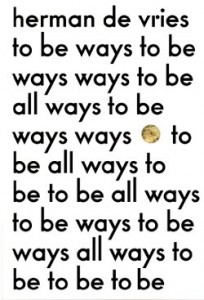
herman de vries
to be all ways to be
Dutch entry 56th Venice Biennale
herman de vries (b. 1931) is representing The Netherlands at the Biennale Arte 2015. Under the title to be all ways to be the Dutch pavilion exhibits new sculptures, objects, works on paper and photography by de vries. Educated as a horticulturist and natural scientist, de vries gathers, orders, isolates and displays objects from nature, directing our attention to both the unity and the diversity of the world around us. In his preparatory travels to Venice, de vries collected many objects from the Laguna, the Giardini and the city, resulting in multiple works both in the Dutch Pavilion and on the deserted island of Lazzaretto Vecchio in the southern Laguna. The exhibition is curated by Colin Huizing and Cees de Boer.
herman de vries has been working for more than sixty years on an uncommonly versatile oeuvre in which art, science and philosophy are juxtaposed with the reality of the world. Initially involved in the international ZERO movement, he has since then focused on natural processes and phenomena and presents these as the primary, physical reality of human existence. The strength and richness of de vries’ oeuvre stems from the biotope developed in his hometown of Eschenau (Germany) and during his travels, including Venice.
The Dutch Pavilion in the Giardini in Venice built by Rietveld in 1954 with its open, transparent and spatially poetic character, symbolizes the rational and optimistically progressive thinking that prevailed during the first half of the Twentieth Century. The organic and natural materials in the work of herman de vries, counter this notion and attest to the idea that natural processes and phenomena are too complex to explain rationally.
The title of the exhibition to be all ways to be, expresses the idea that the experience of and reflection on human existence takes many divergent paths, none of which is superior or inferior to the other. Experienced through the eye, ear, body and nose, the works within the pavilion, the Giardini and at different locations within the Venetian Lagoon, will question existing definitions and positions with regard to nature and culture.
As part of the exhibition herman de vries has explored the surroundings of the city of Venice, the Giardini and the Laguna. One of de vries’s pivotal works: From the Laguna of Venice – a journal, introduces this habitat into the Dutch pavilion. People are encouraged to engage with this habitat: a special boat will ferry them to de vries’s sanctuarium: natura mater at the Lazzaretto Vecchio, several times a week. Tickets for these trips are available at the Dutch Pavilion.
Works by herman de vries are included in museum collections worldwide. In 2014 and 2015 de vries is participating in the retrospective ZERO exhibitions in the Guggenheim Museum New York, Martin Gropius Bau Berlin and Stedelijk Museum Amsterdam.
Colin Huizing (b. 1965) is chief curator at the Stedelijk Museum Schiedam. He curates exhibitions on artists and significant developments in the visual arts since 1960 until today. In 2011 he organized in close cooperation with the ZERO Foundation (Düsseldorf) the exhibition nul = 0, dutch avant-garde in an international context, 1961-1966. In 2014 he curated the exhibition herman de vries – all in the Stedelijk Museum Schiedam.
Cees de Boer (b. 1955) studied General Literature and Philosophy and was awarded a Ph.D. for his research on the collage novels of Max Ernst. Currently he works as a freelance curator, art critic and art advisor. He published books on Sjoerd Buisman and Norman Dillworth; in 2000 he curated Ulay: Performing Light at de Appel arts centre, Amsterdam together with the artist. September 2014 appeared his study of philosophical aspects of the work of herman de vries: Overal stroomt mijn oog.

Publication: The Valiz/Mondriaan Fund publication herman de vries – to be all ways to be offers a parallel world to the exhibition, illuminating all the works on view and highlighting herman de vries in dialogue with Jean-Hubert Martin (Magiciens de la Terre, Centre Georges Pompidou / Grande Halle Parc de la Vilette, 1989; Affinités insolites, Grand Palais Paris, April 2016). Martin confronts de vries with key concepts such as synesthesia, mimesis, craftsmanship, sound and music, smell, nature and ecology, and interweaves the works and thoughts of de vries, with images and other sources throughout his text. This publication opens up historical, art historical and philosophical contexts and perspectives.
For the exhibition and the publication designer Remco van Bladel has transformed the Futura typeface by Paul Renner into a specially customized version, called natura. herman de vries has been using the Futura typeface for more than four decades throughout his work. The natura, which consists only of lower case letters, contains some of the glyphs Renner originally designed in 1925, which were slightly more geometrical than the final Futura. Van Bladel set a system of variables to define the shape of each of these original glyphs through chance operations, thus making the individual letters of the natura both identical yet slightly different as well, in that way constituting a parallel to de vries’ concept that nature presents individual entities only.
ISBN 978 90 78088 99 8
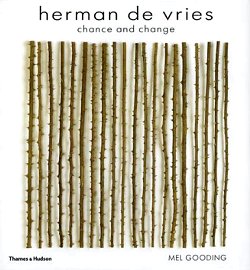 The Dutch pavilion at the Venice Biennale is a significant platform for furthering the international appreciation of contemporary art from the Netherlands, by producing new and topical work dealing with relevant themes in art and society. The Mondriaan Fund is responsible for the Dutch entry to the Venice Biennale. For the 56th edition the Mondriaan Fund again issued an open call to curators, who were asked to produce a plan together with one or more artists in keeping with a State event. A specially appointed jury selected the de vries and Huizing/De Boer plan from five shortlisted proposals. The jury consisted of Hester Alberdingk Thijm (director AkzoNobel Art Foundation), Saskia Bos (dean Cooper Union for the Advancement of Science and Art), Aernout Mik (visual artist), Martijn van Nieuwenhuyzen (curator Stedelijk Museum Amsterdam and chairperson Birgit Donker (director Mondriaan Fund).
The Dutch pavilion at the Venice Biennale is a significant platform for furthering the international appreciation of contemporary art from the Netherlands, by producing new and topical work dealing with relevant themes in art and society. The Mondriaan Fund is responsible for the Dutch entry to the Venice Biennale. For the 56th edition the Mondriaan Fund again issued an open call to curators, who were asked to produce a plan together with one or more artists in keeping with a State event. A specially appointed jury selected the de vries and Huizing/De Boer plan from five shortlisted proposals. The jury consisted of Hester Alberdingk Thijm (director AkzoNobel Art Foundation), Saskia Bos (dean Cooper Union for the Advancement of Science and Art), Aernout Mik (visual artist), Martijn van Nieuwenhuyzen (curator Stedelijk Museum Amsterdam and chairperson Birgit Donker (director Mondriaan Fund).
herman de vries
to be all ways to be
Dutch entry 56th Venice Biennale
Curators: Colin Huizing and Cees de Boer
Commissioner: Mondriaan Fund
9 May-22 November 2015
# website mondriaanfonds
# website herman de vries
fleursdumal.nl magazine
More in: Art & Literature News, Art Criticism, FDM Art Gallery, herman de vries, Sculpture, ZERO art
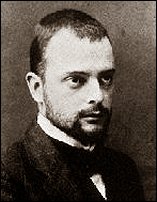
Paul Klee
(1879-1940)
Wasser, darauf Wellen
Wasser
darauf Wellen,
darauf ein Boot,
darauf ein Weib,
darauf ein Mann.
Spruchgedicht von Paul Klee, 1906
fleursdumal.nl magazine
More in: Archive K-L, Expressionism, Klee, Paul
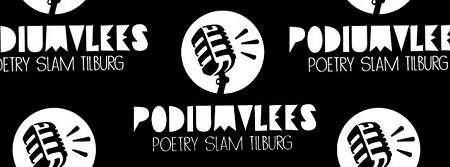
Laatste voorronde Podiumvlees Poetry Slam
Op zondagmiddag 7 juni aanstaande beleeft de Tilburgse Poetry Slam Podiumvlees haar vierde en laatste voorronde. Tijdens deze Poetry Slam zullen bekende en minder bekende (slam)dichters in drie rondes de poëtische strijd met elkaar aangaan. Op het spel staat een plaats in de Tilburgse Stedelijke Finale, die in september 2015 gehouden wordt. De Poetry Slam vindt op zondag 7 juni plaats in De Hall of Fame, Burgemeester Brokxlaan 6 in Tilburg. Aanvang 15.00 uur, toegang is gratis.
In deze editie van Podiumvlees gaan Joris Brussel, Simon Mulder, Kevin Amse, Jolies Heij en Bram Coppens de strijd met elkaar aan om de laatste plaats in de Stedelijke Finale. Zij worden beoordeeld door zowel een vakjury als een publieksjury. Tot nu toe hebben Yannick Moyson, Glenn Markesteyn en Von Solo zich geplaatst voor de Stedelijke finale. De winnaar van de Stedelijke Finale wint een ticket voor het Nederlands Kampioenschap Poetry Slam 2016 in Utrecht.
Podiumvlees is een initiatief van de Tilburgse slamdichters Martin Beversluis en Daan Taks. Zij zijn altijd op zoek naar nieuwe deelnemers. Wie meer informatie wil, kan op facebook terecht: www.facebook.com/podiumvlees
fleursdumal.nl magazine
More in: #More Poetry Archives, Art & Literature News, Poetry Slam, THEATRE
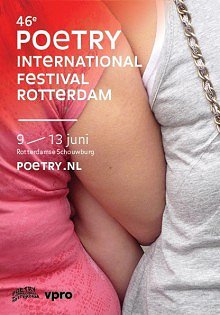 Reasons to be cheerful: van 9 tot en met 13 juni presenteert Poetry International Rotterdam voor de 46ste keer de meest toonaangevende poëzie van eigenzinnige en ontregelende grootmeesters naast die van jonge, originele dichterstalenten van overal ter wereld. Onder hen de Bask Harkaitz Cano, de Aboriginal Lionel Fogarty, Togara Muzanenhamo uit Zimbabwe, de Russen Philip Nikolayev en Lev Rubinstein, Kenneth Goldsmith uit de VS, Yanko González uit Chili, Justyna Bargielska uit Polen, de Duitsers Durs Grünbein, Marion Poschmann en Barbara Köhler, de Engelse Jen Hadfield, Pierre Alferi uit Frankrijk, de Noor Nils Christian Moe-Repstad, Guo Jinniu uit China, Peter Verhelst en Els Moors uit Vlaanderen en Hester Knibbe en Tonnus Oosterhoff uit eigen land. Negentien ‘Reasons to be cheerful!’
Reasons to be cheerful: van 9 tot en met 13 juni presenteert Poetry International Rotterdam voor de 46ste keer de meest toonaangevende poëzie van eigenzinnige en ontregelende grootmeesters naast die van jonge, originele dichterstalenten van overal ter wereld. Onder hen de Bask Harkaitz Cano, de Aboriginal Lionel Fogarty, Togara Muzanenhamo uit Zimbabwe, de Russen Philip Nikolayev en Lev Rubinstein, Kenneth Goldsmith uit de VS, Yanko González uit Chili, Justyna Bargielska uit Polen, de Duitsers Durs Grünbein, Marion Poschmann en Barbara Köhler, de Engelse Jen Hadfield, Pierre Alferi uit Frankrijk, de Noor Nils Christian Moe-Repstad, Guo Jinniu uit China, Peter Verhelst en Els Moors uit Vlaanderen en Hester Knibbe en Tonnus Oosterhoff uit eigen land. Negentien ‘Reasons to be cheerful!’
9 – 13 juni 2015 / Rotterdamse Schouwburg
46e Poetry International Festival Rotterdam
De voordrachten van de festivaldichters vormen de harde kern van het festival. Speciale programma’s brengen daarnaast vooraanstaande dichters, bijzondere poëzie en opvallende fenomenen in beeld. Zoals de dichters rond het Rotterdamse Gard Sivik en de Amsterdamse tegenhanger Barbarber die eind jaren vijftig relativering en humor de poëzie binnen brachten. Of professor Zeman uit Exeter, die de werking van poëzie in het brein onderzoekt en zal illustreren. Maakt poëzie lezen u gelukkig? Kenneth Goldsmith houdt geheel in lijn met de titel van zijn boek Uncreative Writing een bevlogen pleidooi voor hergebruik van taal. Het beste Nederlandstalige poëziedebuut van het jaar wordt voor de 26ste keer bekroond met de C. Buddingh’-prijs en de beste poëzievertaler naar het Duits wordt gehuldigd met de tweejaarlijkse Brockway Prize. Zoals altijd heeft het festival ook verder veel aandacht voor de poëzievertaling met programma’s als de Vertalersslam, Het Juiste Woord en het poëzievertaalproject Met Andere Woorden. Om het overzicht te bewaren maakt het Poëziecafé u dagelijks ontspannen wegwijs door het woud van festivaloptredens en programma’s.
Kunst en film: Voorafgaand aan het festival opent op zondag 7 juni de vierde language & ART Gallery Tour, de tocht langs meer dan vijftien Rotterdamse galeries met beeldend werk van kunstenaars voor wie de taal, het woord en de poëzie inspiratiebron is of direct deel uit maakt van hun opvallende werk. In de Kunsthal ziet u dit jaar werk van alle kunstenaars die elders in de tour exposeren. Op maandag 8 juni staat Poetry on / as Film op het programma met onder meer documentaires over Rogi Wieg, Nobelprijswinnares Hertha Müller en nog veel meer.
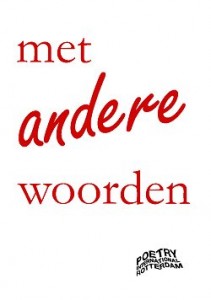 Masterclasses, Craft Talks, VPRO Poetry Academy: Het festival is er niet alleen om te luisteren en te ervaren, maar zeker ook om te doen. Tijdens de masterclasses helpen festivaldichters je verder met tips en tricks voor het lezen en voor het schrijven van poëzie. In de Craft Talks gaan festivaldichters in een half uur tijd dieper in op een bepaalde vorm of een zeker aspect van poëzie. Tijdens de VPRO Poetry Academy neemt Wim Brands u zelfs een volle middag mee op een leerzame reis door de wereld van de poëzie.
Masterclasses, Craft Talks, VPRO Poetry Academy: Het festival is er niet alleen om te luisteren en te ervaren, maar zeker ook om te doen. Tijdens de masterclasses helpen festivaldichters je verder met tips en tricks voor het lezen en voor het schrijven van poëzie. In de Craft Talks gaan festivaldichters in een half uur tijd dieper in op een bepaalde vorm of een zeker aspect van poëzie. Tijdens de VPRO Poetry Academy neemt Wim Brands u zelfs een volle middag mee op een leerzame reis door de wereld van de poëzie.
Festivalbrochure en -App: Uitgebreide informatie over de vele festivaldichters en -programma’s staat binnenkort op deze website. Op 5 mei verschijnt de festivalbrochure als bijlage in de VPRO gids. Geen abonnee, bestel de bijlage dan nu via deze link. Medio mei staat de festival-app online. Meldt u nu alvast aan, dan ontvangt u een reminder zodra de app beschikbaar is.
En op zoek naar een overnachting tijdens het festival? Waarom slaapt u niet eens bij een Rotterdamse dichter thuis. Kijk snel op Wake Up in Poetry.
• Wake Up bij Rotterdamse dichters
• Bekijk de festivalbrochure online
• Download de festival-App
# kijk verder op de website van Poetry International
fleursdumal.nl magazine
More in: #More Poetry Archives, Art & Literature News, MODERN POETRY, Poetry International
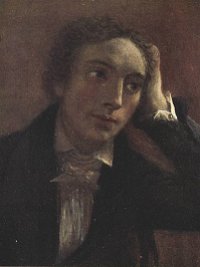
John Keats
(1795-1821)
To Mrs Reynolds’s Cat
Cat! who hast passed thy grand climacteric,
How many mice and rats hast in thy days
Destroyed? How many tit-bits stolen? Gaze
With those bright languid segments green, and prick
Those velvet ears – but prithee do not stick
Thy latent talons in me, and up-raise
Thy gentle mew, and tell me all thy frays
Of fish and mice, and rats and tender chick.
Nay, look not down, nor lick thy dainty wrists –
For all thy wheezy asthma, and for all
Thy tail’s tip is nicked off, and though the fists
Of many a maid have given thee many a maul,
Still is that fur as soft as when the lists
In youth thou enteredst on glass-bottled wall.
John Keats poetry
fleursdumal.nl magazine
More in: Archive K-L, Keats, John
Thank you for reading Fleurs du Mal - magazine for art & literature